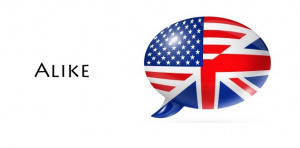Difference between revisions of "Language/English/Vocabulary/Alike"
< Language | English | Vocabulary
Jump to navigation
Jump to search
m (Vincent moved page Language/English/Grammar/Alike to Language/English/Vocabulary/Alike) |
m (Quick edit) |
||
| (2 intermediate revisions by 2 users not shown) | |||
| Line 1: | Line 1: | ||
<div | [[File:Alike.jpg|thumb]] | ||
<div class="pg_page_title"> Alike</div> | |||
==1. The adjective alike means ‘like each other’== | ==1. The adjective alike means ‘like each other’== | ||
| Line 16: | Line 17: | ||
*He’s got two very similar-looking daughters. (not alike daughters) | *He’s got two very similar-looking daughters. (not alike daughters) | ||
==Other Lessons== | |||
* [[Language/English/Vocabulary/Healthy-Habits|Healthy Habits]] | |||
* [[Language/English/Vocabulary/Airport|Airport]] | |||
* [[Language/English/Vocabulary/Prefixes-and-Suffixes|Prefixes and Suffixes]] | |||
* [[Language/English/Vocabulary/Although,-though,-but-and-however|Although, though, but and however]] | |||
* [[Language/English/Vocabulary/Commonly-Confused-Words|Commonly Confused Words]] | |||
* [[Language/English/Vocabulary/Differences-between-'To-marry'-and-'to-get-married'|Differences between 'To marry' and 'to get married']] | |||
* [[Language/English/Vocabulary/As-usual|As usual]] | |||
* [[Language/English/Vocabulary/Not…as-such|Not…as such]] | |||
* [[Language/English/Vocabulary/Phrasal-verbs-with-out|Phrasal verbs with out]] | |||
* [[Language/English/Vocabulary/Along|Along]] | |||
<span links></span> | |||
Latest revision as of 10:24, 27 March 2023
Alike
1. The adjective alike means ‘like each other’[edit | edit source]
Compare:
- The two boys are alike in looks, but not in personality.
- He's like his brother, (not He’s alike his brother.)
2. Alike is not often used before a noun.[edit | edit source]
Compare:
- His two daughters are very much alike.
- He’s got two very similar-looking daughters. (not alike daughters)
Other Lessons[edit | edit source]
- Healthy Habits
- Airport
- Prefixes and Suffixes
- Although, though, but and however
- Commonly Confused Words
- Differences between 'To marry' and 'to get married'
- As usual
- Not…as such
- Phrasal verbs with out
- Along
